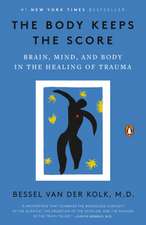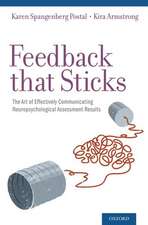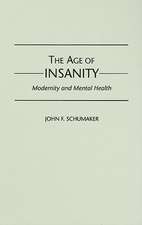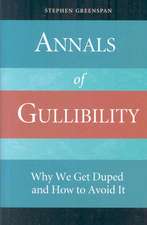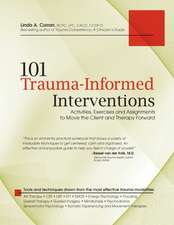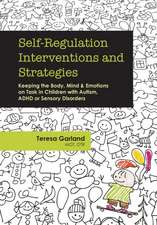Collateral Damage: The Psychological Consequences of America's War on Terrorism: Contemporary Psychology
Editat de Paul Kimmel, Chris E. Stout Ph.D.en Limba Engleză Hardback – 29 aug 2006 – vârsta până la 17 ani
| Toate formatele și edițiile | Preț | Express |
|---|---|---|
| Paperback (1) | 362.03 lei 43-57 zile | |
| Rowman & Littlefield – 8 noi 2000 | 362.03 lei 43-57 zile | |
| Hardback (1) | 322.21 lei 43-57 zile | |
| Bloomsbury Publishing – 29 aug 2006 | 322.21 lei 43-57 zile |
Din seria Contemporary Psychology
- 18%
 Preț: 308.13 lei
Preț: 308.13 lei - 20%
 Preț: 176.85 lei
Preț: 176.85 lei - 18%
 Preț: 320.87 lei
Preț: 320.87 lei - 32%
 Preț: 176.18 lei
Preț: 176.18 lei - 27%
 Preț: 366.92 lei
Preț: 366.92 lei - 27%
 Preț: 439.77 lei
Preț: 439.77 lei - 14%
 Preț: 361.40 lei
Preț: 361.40 lei - 28%
 Preț: 344.87 lei
Preț: 344.87 lei - 24%
 Preț: 363.42 lei
Preț: 363.42 lei - 17%
 Preț: 325.05 lei
Preț: 325.05 lei - 18%
 Preț: 357.81 lei
Preț: 357.81 lei - 14%
 Preț: 356.57 lei
Preț: 356.57 lei - 34%
 Preț: 169.63 lei
Preț: 169.63 lei - 27%
 Preț: 366.69 lei
Preț: 366.69 lei - 24%
 Preț: 365.95 lei
Preț: 365.95 lei - 27%
 Preț: 345.83 lei
Preț: 345.83 lei - 13%
 Preț: 314.10 lei
Preț: 314.10 lei -
 Preț: 194.66 lei
Preț: 194.66 lei - 26%
 Preț: 359.25 lei
Preț: 359.25 lei
Preț: 322.21 lei
Preț vechi: 392.36 lei
-18% Nou
Puncte Express: 483
Preț estimativ în valută:
61.66€ • 64.05$ • 51.22£
61.66€ • 64.05$ • 51.22£
Carte tipărită la comandă
Livrare economică 03-17 februarie 25
Preluare comenzi: 021 569.72.76
Specificații
ISBN-13: 9780275988265
ISBN-10: 0275988260
Pagini: 240
Dimensiuni: 156 x 235 x 24 mm
Greutate: 0.53 kg
Editura: Bloomsbury Publishing
Colecția Praeger
Seria Contemporary Psychology
Locul publicării:New York, United States
ISBN-10: 0275988260
Pagini: 240
Dimensiuni: 156 x 235 x 24 mm
Greutate: 0.53 kg
Editura: Bloomsbury Publishing
Colecția Praeger
Seria Contemporary Psychology
Locul publicării:New York, United States
Notă biografică
Paul R. Kimmel is Chair of the American Psychological Association's Task Force on the Psychological Effects of Efforts to Prevent Terrorism. He is past President of Psychologists for Social Responsibility, and an Adjunct Faculty member at the Saybrook Graduate School and Research Center.Chris E. Stout is Series Editor for the Praeger series, Contemporary Psychology. Stout is a Licensed Clinical Psychologist and a Clinical Full Professor at the University of Illinois College of Medicine's Department of Psychiatry. He served as NGO Special Representative to the United Nations and is a Founding Director of the Center for Global Initiatives. He has published some 300 papers and 30 books and manuals on psychology and his works have been translated into six languages.
Cuprins
Foreword by Philip G. ZimbardoAcknowledgmentIntroduction by Paul R. Kimmelchapter 1 US & THEM: Moderating Group Conflict-A Track Four Diplomacy Program Stephen Fabickchapter 2 9/11 Aftershocks: An Analysis of Conditions Ripe for Hate Crimes Daniel J. Christiechapter 3 Jujitsu Politics: Terrorism and Responses to Terrorism Clark McCauleychapter 4 The Social Psychology of Punishing Dissent: Negative Reactions to Antiwar Views in the United States Bernice Lottchapter 5 Untangling the Web: Threat, Ideology, and Political Behavior Rhoda Ungerchapter 6 Perceptions of Threat, National Representation, and Support for Procedures To Protect the National Group Gordon Hodson, Victoria M. Esses, and John F. Dovidiochapter 7 Efforts To Prevent Terrorism: Impact on Immigrant Groups Nina K. Thomaschapter 8 Psychological Effects of the Virtual Media Coverage of the Iraq War: A Postmodern Humanistic Perspective Ilene A. Serlinchapter 9 The Impact of U.S. Antiterrorism Interventions on Terrorist Motivation: Preliminary Research in Afghanistan and Iraq Michael Wessellschapter 10 Cities of Fear, Cities of Hope: Public Mental Health in the Age of Terrorism Chris E. Stout and Stevan WeineAfterword by Chris E. StoutIndexAbout the Series Advisory BoardAbout the Editors and Contributors
Recenzii
[E]xamines the psychological effects of the U.S. government's antiterrorism measures and takes the reader a step back to look at what this campaign has come to mean..[c]hapters provide readers with discussions that view the problem from a social as well as individual perspectives..[r]ecommendations for improving emergency prepardness efforts are sound, especially their call for collaboration instead of competitiveness among mental health providers and organizations in the wake of disaster..[i]ntroductory comments and the constellation of discussions in this book's chapters serve as a clear starting point for a necessary and ongoing discussion and are as refreshing as the child's declaration that the emperor is wearing no clothes. It is good to know that, in a moment of our history when even a supposedly independent press has largely suspended its critical voice, there are still some who will call it as they see it.
Kimmel, chair of the American Psychological Association's Task Force on the Psychological Effects of Efforts to Prevent Terrorism, together with his fellow psychiatrist Stout, present research conducted by the Task Force on the psychological effects of efforts to prevent terrorism and on programs that provide alternatives to terrorism. Contributors discuss the importance of overhauling the diplomatic approach to terrorism; the ways that the US reaction to 9/11 set conditions conducive to hate crimes; the social psychology of punishing antiwar dissent; relationships between threat, ideology, and political behavior; psychological effects of media coverage of the Iraq war; the impact of US activities in Afghanistan and Iraq on terrorist motivation; public mental health; and other aspects of the War on Terror that can explored through psychological investigation.
Collateral Damage: The Psychological Consequences of America's War on Terrorism goes beyond other books which focus on terrorist tactics to consider the long-term psychological impact of terrorism on this country. From the increased stereotyping of an prejudice against foreigners in general and Arabs in particular to increases in domestic hate crimes and depression, militancy and anger, Collateral Damage examines national reactions to terrorism as a whole and is essential for any in-depth college-level military or social science collection.
Kimmel, chair of the American Psychological Association's Task Force on the Psychological Effects of Efforts to Prevent Terrorism, together with his fellow psychiatrist Stout, present research conducted by the Task Force on the psychological effects of efforts to prevent terrorism and on programs that provide alternatives to terrorism. Contributors discuss the importance of overhauling the diplomatic approach to terrorism; the ways that the US reaction to 9/11 set conditions conducive to hate crimes; the social psychology of punishing antiwar dissent; relationships between threat, ideology, and political behavior; psychological effects of media coverage of the Iraq war; the impact of US activities in Afghanistan and Iraq on terrorist motivation; public mental health; and other aspects of the War on Terror that can explored through psychological investigation.
Collateral Damage: The Psychological Consequences of America's War on Terrorism goes beyond other books which focus on terrorist tactics to consider the long-term psychological impact of terrorism on this country. From the increased stereotyping of an prejudice against foreigners in general and Arabs in particular to increases in domestic hate crimes and depression, militancy and anger, Collateral Damage examines national reactions to terrorism as a whole and is essential for any in-depth college-level military or social science collection.
Descriere
Descriere de la o altă ediție sau format:
From schools advertizing McDonald's, Nike, and Shell oil to students suspended for wearing Pepsi t-shirts on Coke day, this book sifts through a range of incidents to reveal how the rising corporatization of public schools needs to be understood as part of a broader attack on the public sector.
From schools advertizing McDonald's, Nike, and Shell oil to students suspended for wearing Pepsi t-shirts on Coke day, this book sifts through a range of incidents to reveal how the rising corporatization of public schools needs to be understood as part of a broader attack on the public sector.


